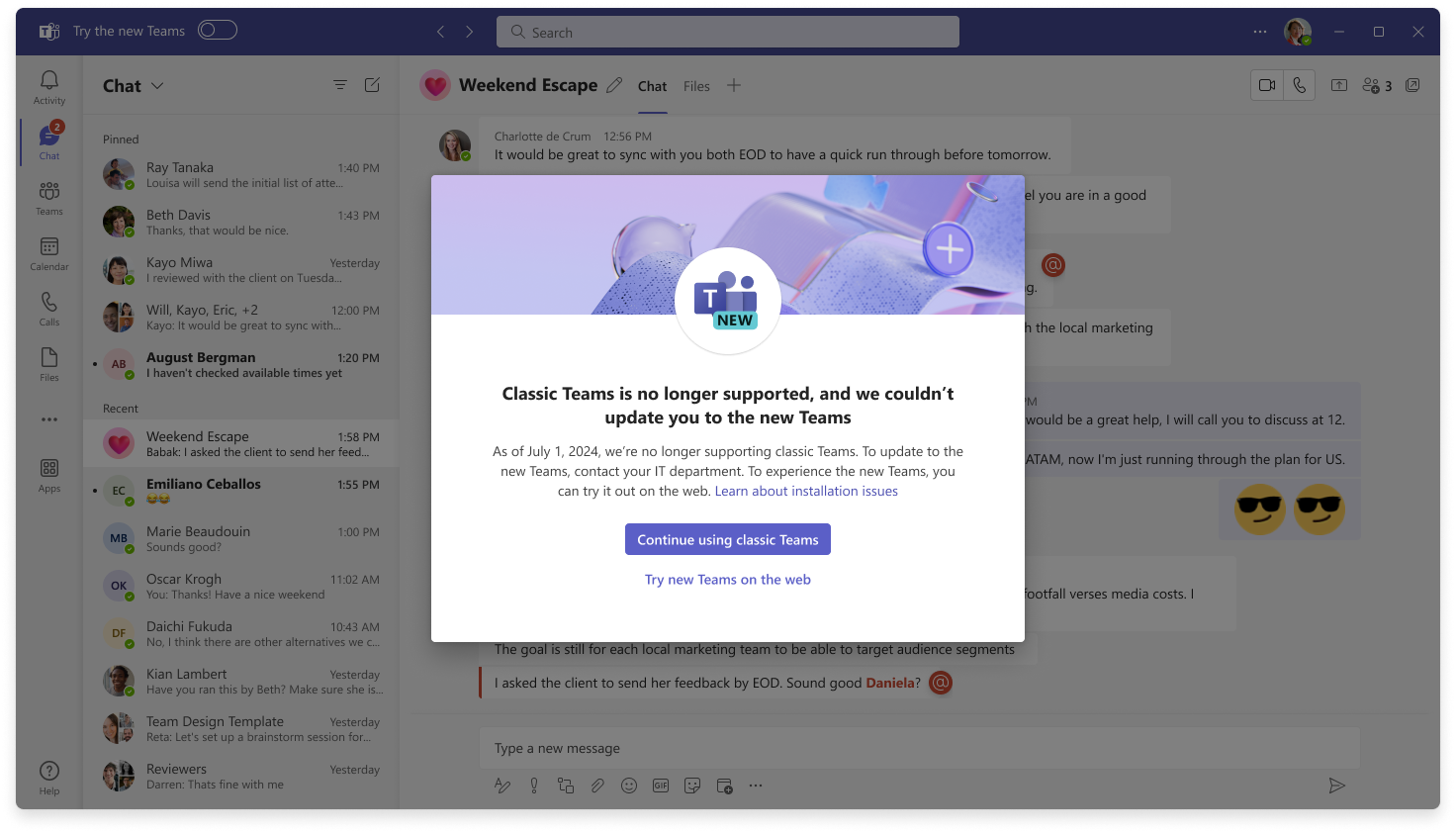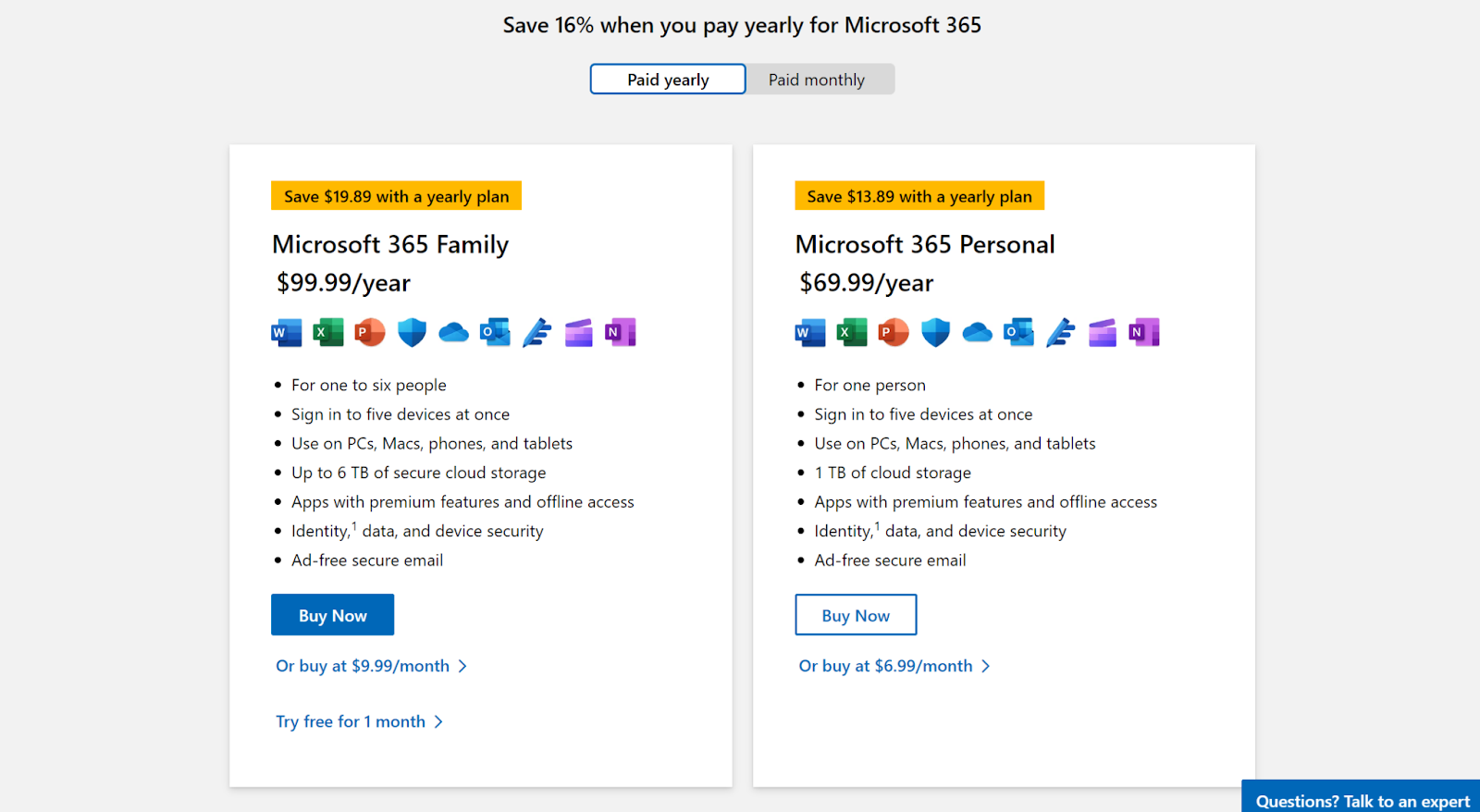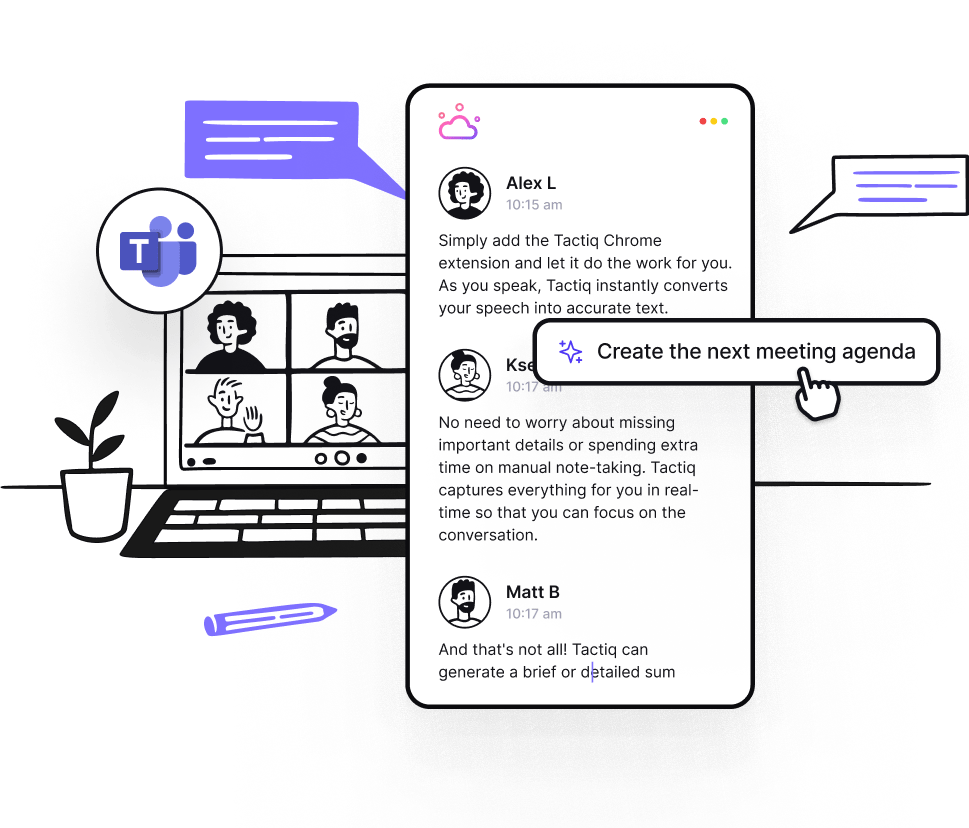What Is Microsoft Teams Classic: An Overview
September 17, 2024
September 17, 2024
July 1, 2025
July 1, 2025
Microsoft Teams Classic was once the go-to tool for virtual collaboration, offering businesses and educators a reliable platform for meetings, chats, and file sharing. As Microsoft transitions users to a newer version, it’s important to understand what made Teams Classic unique, its key features, and why it's being retired.
In this overview, we'll dive into everything you need to know about Microsoft Teams Classic and how it compares to the latest offering. For more insights into Microsoft Teams, check out these related articles: Top Microsoft Teams Alternatives in 2024, Microsoft Teams vs Google Meet: A Detailed Comparison, and ChatGPT for MS Teams: How to Generate Meeting Notes.
What is Microsoft Teams Classic?
Microsoft Teams Classic is the original version of Microsoft's collaboration tool. It was widely used for virtual meetings, chats, and file sharing within organizations. However, Microsoft has since released a newer version, and many users are transitioning to it.
Key Features and Functionalities of Microsoft Teams Classic
- Channels and Teams: Organize conversations and files by creating channels within teams.
- Chat and Messaging: Real-time text chat with single or multiple team members.
- Video Meetings: Schedule and join video calls with screen sharing and recording options.
- File Sharing: Share files and collaborate on documents stored in OneDrive or SharePoint.
- Integration with Microsoft 365: Access to other Microsoft apps like Word, Excel, and PowerPoint.
Differences Between Microsoft Teams Classic and the New Microsoft Teams
- Performance: The new client is optimized for better speed and lower memory usage.
- User Interface: A more streamlined and flexible user interface in the new Teams.
- Features: Some features in the classic version are missing in the new one, such as the ability to save messages directly within Teams.
- Customization: Enhanced customization options in the new Teams, such as changing themes and settings more easily.
Purpose and Target Audience of Microsoft Teams Classic
Microsoft Teams Classic was designed for businesses and educational institutions looking for a robust communication tool. It aimed to streamline team collaboration, making it easier for members to communicate and share resources efficiently. The target audience included small to medium-sized businesses, educational institutions, and large enterprises needing a centralized platform for team interactions.
Why Microsoft Retired Microsoft Teams Classic

Image from Microsoft
Reasons Behind the Retirement of Microsoft Teams Classic in April 2023
In April 2023, Microsoft decided to phase out Microsoft Teams Classic. This decision stemmed from several factors. Primarily, the older version could not keep up with the evolving needs of users. The classic version lacked the performance optimizations and advanced features that modern users demanded. By retiring it, Microsoft aimed to focus resources on a more efficient and feature-rich platform.
Microsoft's Goal to Consolidate Free Teams Experiences
Microsoft aimed to unify the user experience by consolidating its free Teams offerings. Before the retirement, users had multiple versions of Teams to choose from, causing confusion and fragmentation. By merging these into a single streamlined version, Microsoft sought to provide a consistent experience. This consolidation helps in:
- Easier Updates: One version means simpler updates and maintenance.
- Unified User Experience: Users get the same features and interface across all devices.
Impact on Existing Users and Organizations
The retirement of Microsoft Teams Classic significantly impacted existing users and organizations. Here are some key points:
- Data Migration: Users had to migrate their data to the new Teams version. Microsoft provided tools and support to make this transition smooth.
- Learning Curve: Users had to adapt to the new interface and features, requiring some time and training.
- Feature Adjustments: Some features from the classic version were not available in the new Teams, requiring users to find alternative solutions.
Microsoft's Strategy for Future Teams Offerings
Looking ahead, Microsoft has a clear strategy for its Teams platform:
- Performance Enhancements: The new Teams version is designed to be faster and more resource-efficient, ensuring a smoother user experience.
- Expanded Features: Microsoft plans to continually add new features and integrations, making Teams a more versatile tool for collaboration.
- User Feedback: Microsoft actively seeks user feedback to refine and improve the platform, ensuring it meets the needs of its diverse user base.
By focusing on these areas, Microsoft aims to make the new Teams an indispensable tool for businesses and educational institutions worldwide.
How to Check if You're Using Microsoft Teams Classic
Wondering if you're still on Microsoft Teams Classic? Follow these easy steps to find out:
- Open Microsoft Teams: Launch the Teams client on your desktop.
- Select Profile Picture: Click on your profile picture in the top right corner.
- Check Version Text: Look at the text that appears at the top of the menu. If it says "Microsoft Teams Free (classic)," you're using the classic version.
Visual Indicators in the Teams App Interface
You can also use visual cues within the Teams interface to identify the classic Teams app:
- Menu Layout: Classic Teams has a more dated menu layout. The new app has a sleeker, more modern design.
- Icons and Buttons: The buttons and icons in classic Teams might look older and less polished compared to those in the updated version.
Notifications and Banners Alerting Users of the Retirement
Microsoft has made it easy to identify if you're using the classic version by providing notifications:
- In-App Banners: Users will see banners at the top of their Teams window informing them about the retirement of the classic version.

Image from Microsoft
- Pop-Up Notifications: Upon logging in, some users may receive pop-up notifications advising them to switch to the new version.
By following these steps and utilizing the visual indicators and notifications, you can easily determine if you're still using Microsoft Teams Classic and find the necessary resources to upgrade.
What Comes with Upgrading from Microsoft Teams Classic
Benefits of Upgrading
Upgrading from Microsoft Teams Classic to the new version offers several enhancements:
- Full Set of Teams Features: A Microsoft 365 subscription opens up a world of features. You gain access to advanced Teams functionalities such as background blur in video calls, custom backgrounds, and more extensive collaboration tools.
- Scheduled Meetings and Calendar Integration: With the upgrade, you can schedule meetings directly within the Teams app. This feature integrates with your Outlook calendar, making it easier to manage your time and appointments.
- 1 TB File Storage: Each user receives 1 TB of OneDrive storage. This considerable storage capacity supports large file sharing and collaboration without worrying about running out of space.
- Advanced Administration Features: Administrators gain enhanced control over team settings, permissions, and security features. This includes detailed activity reports, user management, and the ability to set policies and compliance settings.
- No Data Loss During Upgrade: When upgrading, all your data, including chats, files, and settings, remains intact. Microsoft ensures a seamless transition, so you won't lose important information.
Upgrade Options
When upgrading from Microsoft Teams Classic, you have two main options:
Microsoft 365 Subscription
- Complete Access: This plan provides full access to all Microsoft 365 apps, including Word, Excel, PowerPoint, and Teams. It's an all-in-one solution for businesses of all sizes.
- Enhanced Collaboration: Benefit from advanced collaboration tools such as real-time co-authoring in documents and integrated communication across apps.
- Security and Compliance: Enjoy robust security features like advanced threat protection, data loss prevention, and compliance solutions tailored to your industry's needs.
Microsoft Teams Essentials
- Affordable Solution: For small businesses or teams that need basic collaboration tools, Microsoft Teams Essentials offers a cost-effective option.
- Key Features: This plan includes unlimited group meetings for up to 30 hours, chat, file sharing, and basic administrative controls.
- Easy Upgrading Path: If your needs grow, you can easily upgrade to a Microsoft 365 subscription to unlock more features.
By understanding these benefits and options, you can make an informed decision on upgrading from Microsoft Teams Classic, ensuring your team has the tools they need for effective communication and collaboration.
Things to Keep in Mind Before Upgrading
Necessity to Upgrade the Entire Organization Simultaneously
When upgrading from Microsoft Teams Classic, it's essential to upgrade the entire organization at once. Microsoft doesn't support a mix of free and paid users within the same organization. This means every member of your team must transition simultaneously to avoid any disruptions in communication and collaboration.
Key Point: Upgrade everyone at the same time to maintain seamless communication.
Incompatibility of Merging Teams Free (Classic) with Existing Paid Subscriptions
Merging Teams Free (Classic) with an existing paid Microsoft 365 subscription isn't an option. If your organization already uses a paid subscription, you must upgrade all users to the same plan. This ensures that all features and functionalities are consistent across the board.
Important Note: You cannot combine free and paid subscriptions within the same organization.
Requirements for Organizations with More Than 300 Users
For larger organizations, specific requirements come into play. If your organization has more than 300 users, you need to upgrade to an enterprise license, such as Office 365 E1. This plan supports a large number of users and offers additional features tailored for big teams.
Essential Requirement: Upgrade to an enterprise license for organizations exceeding 300 users.
Steps to Manage and Remove Members Before the Upgrade
Before initiating the upgrade process, it's crucial to manage and possibly remove members who don't need to be part of the new setup. This step ensures a smoother transition and avoids unnecessary costs.
- Review Current Members: Go through the list of current users and determine who needs access to the upgraded features.
- Remove Unnecessary Members: Remove any users who no longer need access to the team or who won't be upgraded.
- Communicate Changes: Inform all team members about the upcoming changes and what they can expect during the transition.
- Prepare Backup: Ensure all important data and conversations are backed up to prevent any loss during the upgrade.
Action Steps: Review, remove unnecessary members, communicate changes, and prepare backups for a smooth upgrade.
By keeping these points in mind, you can ensure a seamless and efficient upgrade from Microsoft Teams Classic, setting your organization up for success with the new and improved Teams features.
How to Upgrade Your Organization from Microsoft Teams Classic
Detailed Instructions on Choosing the Right Product for Your Organization

Selecting the right product for your organization involves considering your team's size and specific needs. Microsoft offers various plans, including Microsoft Teams Essentials and Microsoft 365 subscriptions. Evaluate the features and compare them to your organization's requirements. For instance, if you need advanced administration tools and larger file storage, a Microsoft 365 subscription might be the best fit.
Key Steps:
- Assess Needs: Determine the features your organization needs.
- Compare Plans: Look at Microsoft Teams Essentials vs. Microsoft 365.
- Choose Plan: Select the plan that matches your requirements.
Takeaway: Choose the plan that aligns with your team's needs for optimal performance.
Purchasing Licenses and Setting Up Temporary and Custom Domains
After choosing the right plan, the next step involves purchasing licenses and setting up domains. Microsoft provides detailed instructions for this process.
- Purchase Licenses: Buy the necessary licenses through the Microsoft admin portal.
- Set Up Temporary Domain: During the upgrade, Microsoft assigns a temporary domain like contoso.onmicrosoft.com.
- Create Custom Domain: Later in the process, you can create a custom domain that reflects your organization's identity.
Steps to Follow:
- Buy Licenses: Navigate to the admin portal; select the desired plan and purchase licenses.
- Temporary Domain: Use the temporary domain provided initially.
- Custom Domain: Customize your domain name for a professional appearance.
Important Note: Temporary domains are placeholders. Customize your domain to match your branding.
By following these steps, you can upgrade your organization from Microsoft Teams Classic efficiently, ensuring all members have access to the new features and capabilities.
{{rt_cta_ai-convenience}}
How Tactiq Can Help with Microsoft Teams Classic Transitions

Tactiq is a powerful tool designed to improve your Microsoft Teams experience by offering real-time transcription, AI-generated summaries, and customizable AI prompts. Here's how it can improve your virtual meetings:
- Real-Time Transcriptions: Tactiq captures everything said during meetings, eliminating the need for manual note-taking.
- AI Meeting Kits and Prompts: Use AI meeting kits and prompts to simplify follow-up tasks, such as drafting emails or creating action items.
- Actionable Insights: Tactiq automatically generates summaries and action items from meeting transcripts, saving time and ensuring key points are addressed.
- Enhanced Collaboration: Tactiq Spaces allows easy sharing and searching of meeting transcripts, improving team collaboration and access to important details.
With Tactiq, transitioning from Microsoft Teams Classic becomes smoother, ensuring you capture and act on all key meeting points. Download the free Tactiq Chrome Extension today!
Microsoft Teams Classic offered core features like channels, real-time chat, video meetings, and integration with Microsoft 365 apps. The new version improves on this with faster performance, a modern interface, enhanced customization, and some missing classic features, so you get a more efficient and flexible collaboration experience.
Microsoft retired Teams Classic in April 2023 to focus on a faster, more feature-rich platform that meets modern collaboration needs. This shift means you get a unified, regularly updated Teams experience with better performance and fewer compatibility issues.
You can check by clicking your profile picture in Teams and looking for 'Microsoft Teams Free (classic)' in the menu. Visual cues like an older menu layout, less polished icons, and in-app banners or pop-up notifications also alert you if you’re on the classic version.
You need to upgrade your entire organization at once, as mixing free and paid users isn’t supported. Review and remove unnecessary members, communicate changes, and back up important data to ensure a smooth, disruption-free transition.
Tactiq provides real-time meeting transcriptions, AI-generated summaries, and actionable insights, so you never miss key points during your upgrade. You save time and boost collaboration by easily sharing and searching meeting transcripts, making your move to the new Teams seamless.
Want the convenience of AI summaries?
Try Tactiq for your upcoming meeting.
Want the convenience of AI summaries?
Try Tactiq for your upcoming meeting.
Want the convenience of AI summaries?
Try Tactiq for your upcoming meeting.









